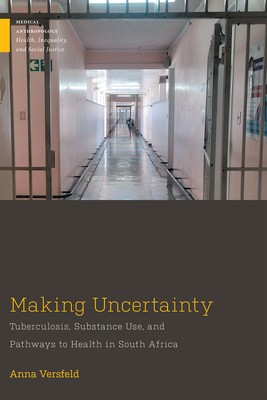
- We will send in 10–14 business days.
- Author: Anna Versfeld
- Publisher: Rutgers University Press
- ISBN-10: 1978822472
- ISBN-13: 9781978822474
- Format: 15 x 22.6 x 1.4 cm, softcover
- Language: English
- SAVE -10% with code: EXTRA
Reviews
Description
In Cape Town, South Africa, many people with tuberculosis also use substances. This sets up a seemingly impossible problem: People who use substances are at increased risk of tuberculosis disease; and substance use seems to result in erratic behavior that makes successful treatment of people affected by tuberculosis extremely difficult. People affected don't get healthy, healthcare providers are frustrated, and families seek to balance love and care for those who are ill with self-protection. How are we to understand this? Where does the responsibility for poor health and healing lie? What are the possibilities for an effective healthcare response? Through a close look at lives and care, Making Uncertainty: Tuberculosis, Substance Use, and Pathways to Health shows how patterns of substance use, tuberculosis disease, and their interaction are shaped by history, social context, and political economy. This, in turn, generates new perspectives on what makes poor health, and what good care might look like.
EXTRA 10 % discount with code: EXTRA
The promotion ends in 20d.07:17:18
The discount code is valid when purchasing from 10 €. Discounts do not stack.
- Author: Anna Versfeld
- Publisher: Rutgers University Press
- ISBN-10: 1978822472
- ISBN-13: 9781978822474
- Format: 15 x 22.6 x 1.4 cm, softcover
- Language: English English
In Cape Town, South Africa, many people with tuberculosis also use substances. This sets up a seemingly impossible problem: People who use substances are at increased risk of tuberculosis disease; and substance use seems to result in erratic behavior that makes successful treatment of people affected by tuberculosis extremely difficult. People affected don't get healthy, healthcare providers are frustrated, and families seek to balance love and care for those who are ill with self-protection. How are we to understand this? Where does the responsibility for poor health and healing lie? What are the possibilities for an effective healthcare response? Through a close look at lives and care, Making Uncertainty: Tuberculosis, Substance Use, and Pathways to Health shows how patterns of substance use, tuberculosis disease, and their interaction are shaped by history, social context, and political economy. This, in turn, generates new perspectives on what makes poor health, and what good care might look like.


Reviews